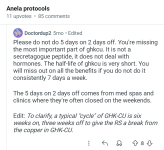Sorry for the wall of science answer , but you did ask.
There are no clinical trials of KLOW or GLOW in humans. Or in animals that I could find.
There have been 3 small clinical trials in humans of BPC 157 , for arthitis, cystitis and basic phase 1 toxicity test. Nearly all the research comes from a small localised set of researchers. The paper I read by them was dodgy AF. DOI: 10.3390/ph16050676 . Basically claiming it was a miracle cure, not differentiating between animal and human tests when talking about evidence and massively overstating its effectiveness compared to the evidence. No real research anywhere else. If it was as good as some of the rodent studies suggest this would not be the case.
There have been clinical trials of GHK-Cu in humans but only applied externally to the skin, not injected or oral treatment. Not being developed as a systemic treatment
There have been clinical trials of thymosin beta 4 in humans , it is currently being tested as an PCI injection (percutaneous coronary intervention), after heart attacks, and a phase 1b study iv for basic safety for use in humans
As far as I can tell KPV has never been tested in humans. It is still being researched mainly as nanoparticles with kpv attatched as a therapy for ulcerative colitis but not near human testing
There is zero doubt that these peptides do things, often quite beneficial things in the body. The problem is partly that most are not patentable so no company will pour money into researching them, only publicly funded research, and they mostly have too many effects. Drug companies generally want compounds that do a single specific thing to one receptor ( that is well studied and understood ) so it is possible to work out the effects, and there are no off target effects . So they don't spend a billion dollars on research only to find some unexpected adverse effect. Most of the peptides in KLOW have very broad effects, on many different body systems, and in general are not well understood. Trying to work out all these effects would require an enormous amount of research, before human trials could be considered, and then they would have to be huge in scale to make sure less common effects were found given the incomplete understanding of how they work.
Unfortunately just because lab and animal studies look good does not mean they will work in humans. There are dozens of treatments that prevent, treat or reverse Alzheimer's disease in rat and mouse models, but they have all failed ( to make more than a minor difference ) when tested in humans.
Going on anecdotal reports online, many people have said it has helped make healing faster, which is interesting and is a sort of evidence, unfortunately it does not prove anything. Before the scientific method people believed a lot of very weird things were effective treatments, blood letting by leeches was very popular for centuries.
The most obvious concern is that many of them significantly alter growth signals and angiogenesis, which produces reasonable concerns about the possibility of initiating or enhancing the growth of tumours, and the fact that their effects are not well understood. Most of these peptides are not likely to have further development as drugs, and I do not think any researchers would ever test klow on humans in a clinical trial due to the complexity and unpredictability of its possible effects.


